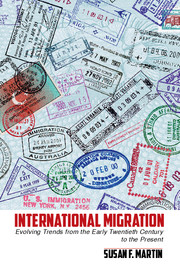Book contents
- Frontmatter
- Contents
- Foreword
- Acknowledgments
- List of Acronyms
- Introduction
- 1 Early Roots
- 2 “The Problem of Refugees”
- 3 Labor Mobility
- 4 Orderly and Humane Migration Management
- 5 Trafficking in Persons
- 6 Migration and International Security
- 7 Migration, the Environment, and Climate Change*
- 8 Migration and Development
- 9 Towards the Future
- Bibliography
- Index
6 - Migration and International Security
Published online by Cambridge University Press: 05 August 2014
- Frontmatter
- Contents
- Foreword
- Acknowledgments
- List of Acronyms
- Introduction
- 1 Early Roots
- 2 “The Problem of Refugees”
- 3 Labor Mobility
- 4 Orderly and Humane Migration Management
- 5 Trafficking in Persons
- 6 Migration and International Security
- 7 Migration, the Environment, and Climate Change*
- 8 Migration and Development
- 9 Towards the Future
- Bibliography
- Index
Summary
This chapter examines one means through which an emerging international migration regime should be understood: cooperation in addressing international security challenges arising from increased global mobility. The focus of this chapter is the establishment of mechanisms to share information and coordinate actions to reduce the risk of migration for source, transit and destination countries. Two distinct issues are addressed from a security perspective: unauthorized/irregular migration and movements of terrorists and criminals. The issues covered include regulation of short-term cross-border movements for business and tourism – what Rey Koslowski (2011) has described as the international travel regime. The engagement of international organizations that are not usually considered a part of the migration system (e.g., the International Civil Aviation Administration) will be examined. Of particular interest is the evolving normative framework for addressing issues of human smuggling. The security dimension of refugee and asylum movements will be referenced as they pertain to these issues, with the broader connections having been discussed in Chapter 2.
The interconnection between migration and security concerns raises challenges for governments in three areas: (1) how best to cooperate in ensuring that those who pose security threats are not able to carry out their activities cross borders; (2) how to accomplish this task without overly impeding legitimate, beneficial international mobility; and (3) how to ensure that individual rights and privacy are protected in the process. In an age of globalization, in which eradicating barriers to business travel and tourism is a core objective, finding the appropriate balance between facilitation and control is difficult. Similarly, respect for privacy and rights calls for protection of the individual against intrusions by the state but security often necessitates some exceptions in the interest of the public good. A key issue discussed in this chapter is the role of international bodies in setting priorities and principles that will reach the correct balance among these interests.
Information
- Type
- Chapter
- Information
- International MigrationEvolving Trends from the Early Twentieth Century to the Present, pp. 182 - 213Publisher: Cambridge University PressPrint publication year: 2014
